See also
- Agony in the Garden, the Gethsemane episode in the life of Jesus
- Agony in the Garden (disambiguation), depictions of the Gethsemane episode in art
Gethsemane is a garden in Jerusalem believed to be the place where Jesus and his disciples prayed the night before the crucifixion.
Gethsemane may also refer to:
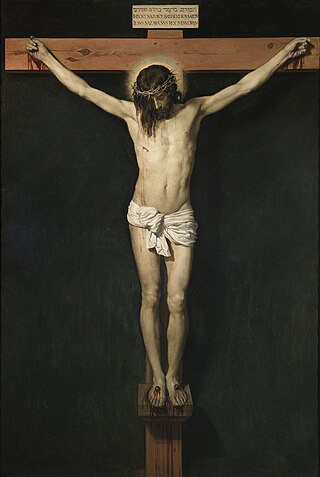
Good Friday is a Christian holy day observing the crucifixion of Jesus and his death at Calvary. It is observed during Holy Week as part of the Paschal Triduum. It is also known as Black Friday, Holy Friday, Great Friday, Good Friday of the Passion of the Lord,Great and Holy Friday.
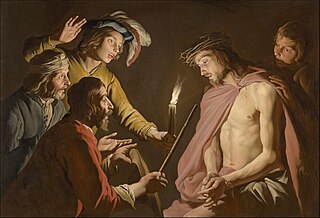
The Passion is the short final period before the death of Jesus, described in the four canonical gospels. It is commemorated in Christianity every year during Holy Week.

The Feast of Corpus Christi, also known as the Solemnity of the Most Holy Body and Blood of Christ, is a Christian liturgical solemnity celebrating the Real Presence of the Body and Blood, Soul and Divinity of Jesus in the elements of the Eucharist; it is observed by the Latin Church, in addition to certain Western Orthodox, Lutheran, and Anglican churches. Two months earlier, the institution of the Eucharist at the Last Supper is observed on Maundy Thursday in a sombre atmosphere leading to Good Friday. The liturgy on that day also commemorates Christ's washing of the disciples' feet, the institution of the priesthood, and the agony in the Garden of Gethsemane.
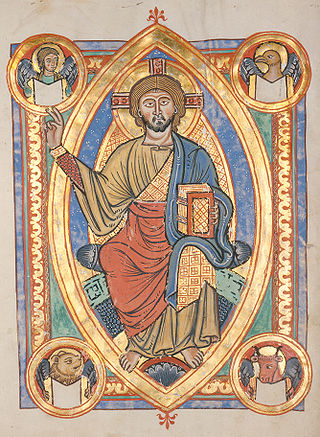
The Stations of the Cross or the Way of the Cross, also known as the Way of Sorrows or the Via Crucis, are a series of images depicting Jesus Christ on the day of his crucifixion and accompanying prayers. The stations grew out of imitations of the Via Dolorosa in Jerusalem, which is a traditional processional route symbolising the path Jesus walked to Mount Calvary. The objective of the stations is to help the Christian faithful to make a spiritual pilgrimage through contemplation of the Passion of Christ. It has become one of the most popular devotions and the stations can be found in many Western Christian churches, including those in the Roman Catholic, Lutheran, Anglican, and Methodist traditions.
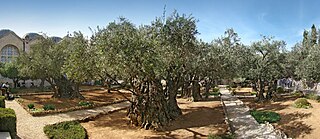
Gethsemane is a garden at the foot of the Mount of Olives in East Jerusalem where, according to the four Gospels of the New Testament, Jesus Christ underwent the agony in the garden and was arrested before his crucifixion. It is a place of great resonance in Christianity. There are several small olive groves in church property, all adjacent to each other and identified with biblical Gethsemane.

The Church of All Nations, also known as the Church of Gethsemane or the Basilica of the Agony, is a Catholic church located on the Mount of Olives in East Jerusalem, next to the Garden of Gethsemane. It enshrines a section of bedrock where Jesus is said to have prayed before his arrest.

James Francis Stafford is an American cardinal of the Roman Catholic Church. He served as major penitentiary of the Apostolic Penitentiary from 2003 to 2009.
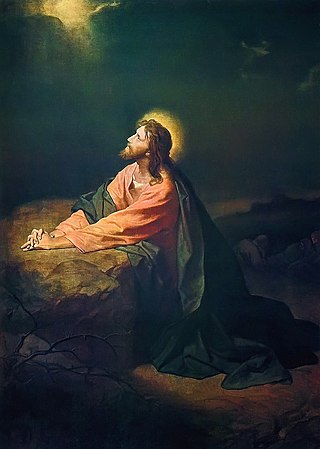
The agony in the Garden of Gethsemane is an episode in the life of Jesus, which occurred after the Last Supper and before his betrayal and arrest, all part of the Passion of Jesus leading to his crucifixion and death. This episode is described in the three Synoptic Gospels in the New Testament. According to these accounts, Jesus, accompanied by Peter, John and James, enters the garden of Gethsemane on the Mount of Olives where he experiences great anguish and prays to be delivered from his impending suffering, while also accepting God's will.

Decision theology, also known as decisionism, is the belief of some evangelical denominations of Christianity, such as the Baptist and Methodist churches, that individuals must make a conscious decision to "accept" and follow Christ.
The Divine Service is a title given to the Eucharistic liturgy as used in the various Lutheran churches. It has its roots in the Pre-Tridentine Mass as revised by Martin Luther in his Formula missae of 1523 and his Deutsche Messe of 1526. It was further developed through the Kirchenordnungen of the sixteenth and seventeenth centuries that followed in Luther's tradition.
Agony may refer to:

Holy Hour is the Roman Catholic devotional tradition of spending an hour in Eucharistic adoration in the presence of the Blessed Sacrament. A plenary indulgence is granted for this practice. The practice is also observed in some Lutheran churches and some Anglican churches.
Evangelist may refer to:
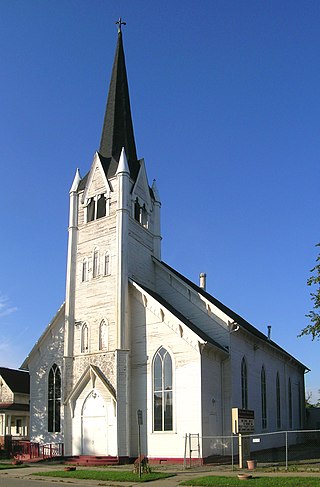
The Gethsemane Evangelical Lutheran Church is a church located at 4461 Twenty-Eighth Street in Detroit, Michigan. It was designated a Michigan State Historic Site in 1980 and listed on the National Register of Historic Places in 1982. The building now houses the Motor City Missionary Baptist Church.
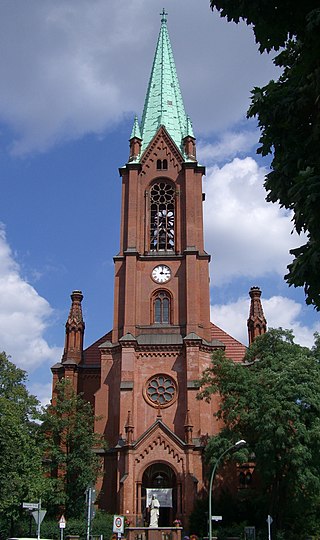
Gethsemane Church is one of four church buildings of the Lutheran Northern Prenzlauer Berg Evangelical Congregation, within the Evangelical Church of Berlin-Brandenburg-Silesian Upper Lusatia, an umbrella organisation which includes Lutheran, Reformed, and United Protestant Calvinist congregations.
In Lutheranism, the Eucharist refers to the liturgical commemoration of the Last Supper. Lutherans believe in the real presence of Christ in the Eucharist, affirming the doctrine of sacramental union, "in which the body and blood of Christ are truly and substantially present, offered, and received with the bread and wine."
Gethsemane is a chamber-oratorio by the British composer Matthew King. Commissioned for the opening concert of the 1998 Spitalfields Festival, the work was composed for the early music group, Florilegium and is scored for 4 vocalists and a 'Baroque' ensemble consisting of flute solo, 2 oboes, 3 natural trumpets, strings, harpsichord and percussion. The oratorio uses a compilation of Biblical texts to relate the New Testament narrative from Jesus' triumphal entry into Jerusalem until his arrest in the Garden of Gethsemane. Each of the four vocalists represents several characters in the story and all four join together to sing collectively as disciples, pharisees and various crowds. Certain instruments within the ensemble are used to represent characters in the drama: for example, Jesus is always accompanied with a flute, the pharisees are joined by rumbling timpani and Judas by a solo harpsichord.

Gethsemane Lutheran Church is a historic Lutheran church in downtown Austin, Texas. Designated as a Recorded Texas Historic Landmark and listed on the National Register of Historic Places, the building currently holds offices of the Texas Historical Commission.
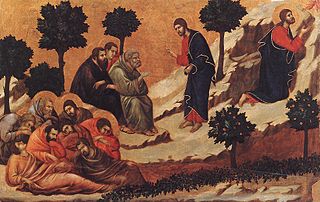
Tristis est anima mea is the second responsory of the Tenebrae for Maundy Thursday. The Latin text refers to Christ's Agony in the Garden of Gethsemane, a part of his Passion.